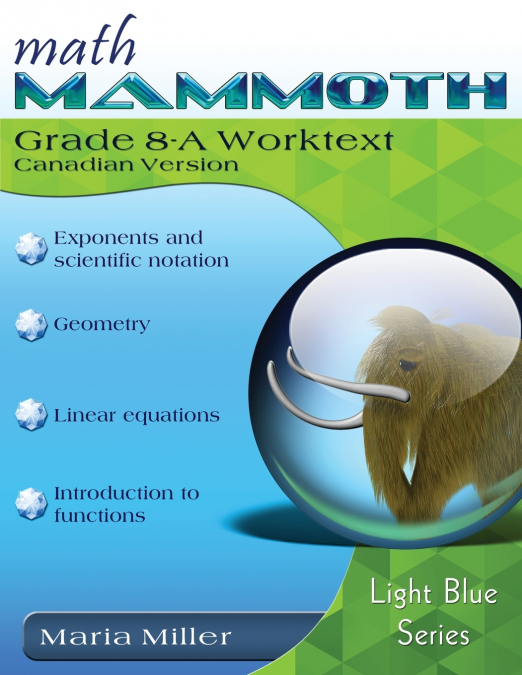
Maria Miller
Math Mammoth Grade 8-A Worktext, Canadian version is the student book for the first half of grade 8, and part of the Math Mammoth Grade 8 complete curriculum. The curriculum is essentially the same as the U.S. version of Math Mammoth Grade 8, only customized for the Canadian audience in these aspects:- The curriculum uses the metric measurement units. Since Canadians do use some imperial units (e.g. miles, pounds) in some contexts, the curriculum does infrequently use them.- The spelling conforms mostly to American English, taking into account a few key differences where Canadian English follows British English.- Numbers are formatted with a space as a thousands separator, and a point as a decimal separator.- Page (paper) size is Letter.The US version of the curriculum is aligned to the Common Core Standards, which means this curriculum may not be properly aligned to the eighth grade standards in your province. However, you can probably find material for any missing topics in neighbouring grades.This book starts with a study of exponent laws, using both numerical and algebraic expressions. The first chapter also covers scientific notation (both with large and small numbers), significant digits, and calculations with numbers given in scientific notations.In chapter 2, students learn about geometric transformations (translations, reflections, rotations, dilations), common angle relationships, and volume of prisms, cylinders, spheres, and cones. Next, in chapter 3, our focus is on linear equations.Students both review and learn more about solving linear equations, including equations whose solutions require the usage of the distributive property and equations where the variable is on both sides.Chapter 4 presents an introduction to functions. Students construct functions to model linear relationships, learn to use the rate of change and initial value of the function, and they describe functions qualitatively based on their graphs.FeaturesMath Mammoth focuses on conceptual understanding. It explains the 'WHY', so students can understand the math, not just learn 'HOW' to do it.The curriculum is mastery-oriented. This means it concentrates fairly long on a topic, delving into its various aspects. This promotes conceptual understanding, as opposed to spiral curricula that often tend to jump from topic to topic too much.It requires very little teacher preparation.The curriculum has no separate teacher’s manual nor is it scripted. The introduction to each chapter has some notes for the teacher concerning the material in the chapter. All the instruction is written directly to the student in the worktext.After each chapter introduction, you will find a list of Internet links and resources (games, quizzes, animations, etc.) that can be used for fun, illustrations, and further practice.